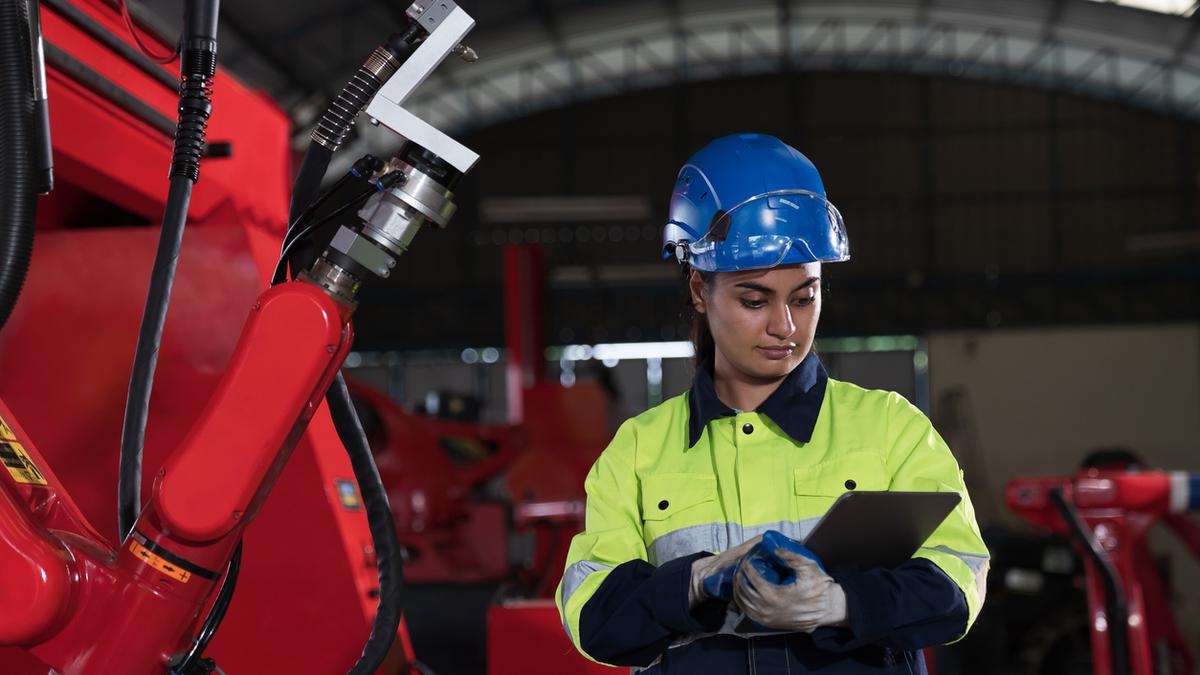Mechanical Engineering remains vital, and AI should be seen as an enabler rather than a replacement. | Photo: iStock/ Getty Images
Artificial Intelligence (AI) has become an integral part of various domains, including mechanical engineering. While Machine Learning (ML) has been utilised in the field for some time, recent advancements in AI have led to its increased adoption. Given the rapid pace of these changes, students and teachers in mechanical engineering must prepare for an AI-driven future.
A recent webinar held by The Hindu on February 22 at 5 p.m., brought together leading experts in AI and mechanical engineering to discuss how AI is transforming the field and how academic institutions can adapt their curricula.
The panelists included: Professor Arun K. Tangirala, Department of Chemical Engineering, IIT Tirupati, and Department of Data Science and AI, Wadhwani School of Data Science and AI, IIT Madras; Professor Balaji Srinivasan, Mechanical Engineering Department, IIT Madras, specializing in Autonomous Thermal Learning Systems; Dr. Senthil Kumar Vadivelu, Industry expert with 21+ years of experience in Industrial R&D, specializing in AI applications in mechanical engineering.
The growing role of AI in Mechanical Engineering
AI is increasingly being integrated into Mechanical Engineering, influencing various aspects such as:
Predictive maintenance and diagnostics: AI enables real-time monitoring of machinery and predicts failures before they occur, reducing downtime and increasing efficiency.
Design and optimization: AI-driven generative models enhance CAD and finite element analysis (FEA), allowing for rapid prototyping and improved design processes.
Simulation and automation: AI accelerates computational simulations like Computational Fluid Dynamics (CFD) and automates complex industrial processes.
Smart manufacturing and IoT integration: Federated ML and IoT-based solutions are enhancing manufacturing efficiency and decision-making.
AI-Augmented control systems: Traditional controllers are being supplemented with AI-based models to improve automation and precision.
Curriculum and training for AI Integration
Panelists emphasized the need for educational institutions to adapt to these changes by introducing foundational AI and ML courses at the undergraduate level, offering AI-integrated minors and dual-degree programs in Mechanical Engineering, revamping lab work to include AI-driven experiments and data analytics.
The panellists also suggested encouraging self-learning and industry-academia collaboration to expose students to real-world AI applications, conducting faculty development programs (FDPs) to ensure instructors are equipped with AI knowledge and pedagogical tools.
Industry perspective and career readiness
Dr. Senthil Kumar highlighted the importance of hands-on experience with industrial datasets and real-world AI applications. He recommended that students develop proficiency in programming languages such as Python, gain exposure to ML techniques relevant to mechanical engineering, such as time-series analysis and statistical signal processing.
He also suggested students work on industry-relevant projects and internships to gain practical insights, engage with open datasets from platforms like NASA and Prognostics and Health, Management (PHM) Society to enhance their problem-solving skills.
AI in CAD, Design, and Manufacturing
AI-powered CAD tools are transforming mechanical design by automating repetitive tasks and optimizing design structures. AI is also improving manufacturing processes by enabling defect detection, enhancing quality control, and streamlining supply chain operations.
Key takeaways from the webinar
The webinar highlighted that Mechanical Engineering remains vital, and AI should be seen as an enabler rather than a replacement. AI knowledge is becoming essential, and students should embrace it as a complementary skill. Self-learning and interdisciplinary collaboration are crucial for staying ahead in the evolving job market. Faculty and institutions must actively integrate AI into their courses and research.
The integration of AI into mechanical engineering is an inevitable and exciting development. By embracing AI, students and teachers can ensure they remain relevant in the industry. Whether through curriculum changes, self-learning, or industry collaborations, now is the time to prepare for an AI-enhanced future in mechanical engineering.
(Please email your suggestions and feedback on education to [email protected])
Published – February 28, 2025 09:49 pm IST
